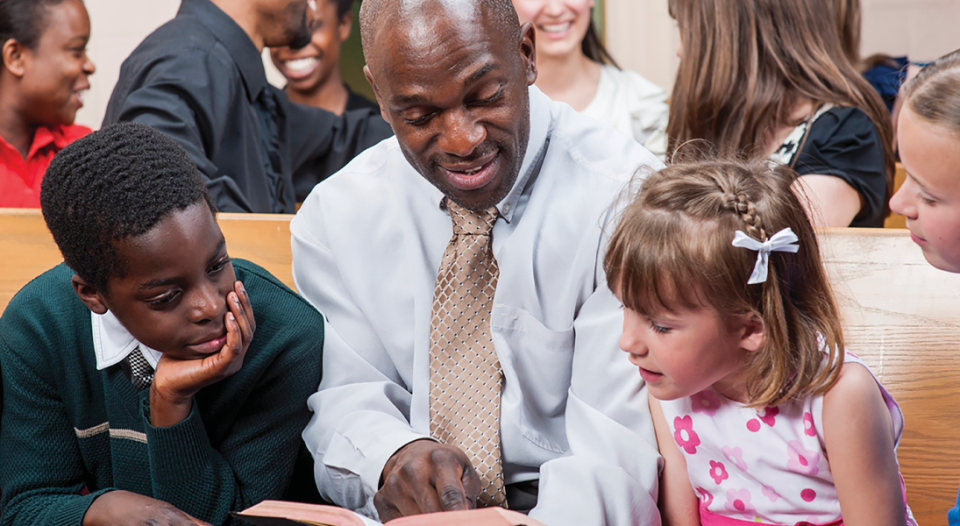Faith formation is one of the few things we grow from our birth until death. This lifelong process of growing disciples centers on our relationship with Jesus and with others. After all, his life and ministry focused on relationships. He took time to sit with the children, women, sinners, disciples and crowds that followed him. Jesus models for us the steps to what we now call intergenerational ministry.
Here are 10 steps to jump-start intergenerational ministry in your congregation.
Pray. Ground everything in prayer. Invite others to pray with and for the planning. Pray for those whom God is preparing to participate.
Purpose. Understand your why. “Story Matters” is a great ELCA tool to claim your congregation’s biblical story so you know your why. When we get sidetracked by what other congregations are doing, we can lose our why and our purpose. Continue to return to your why each step of the way.
Probe. Share and seek out new ideas. Websites such as faithfulteaching.org and lifeoffaith.info and Facebook groups such as “Christian Education Network of the ELCA” and “Messy Church USA” are some of the great resources available to anyone. Join the conversation and learn from others.
Plan. Start small—seasonally, quarterly, monthly. The quickest way to frustration is to start too big or too often. One congregation began its intergenerational ministry with two events. Their Rally Day service project gathered all ages to make tuna noodle casserole bags for a food pantry. For Epiphany, they focused on stations of prayer. Each of the 12 stations had a different prayer method or supplies to help participants grow in their prayer life. After two successful events, the congregation’s planning team had the confidence to increase to quarterly events.
Participants. Key individuals are those who have a passion for helping grow disciples. They have an openness to new ideas and don’t get stuck in the mindset of “the way we have always done it.” Pray, asking God to identify those key individuals. Invite a few to be part of the pilot. Pray over each of these individuals and share the vision with them. Get them on board with small events so they will invite others as your ministry grows.
Instead of focusing on numbers, focus on the stories. Ask, “What is the best thing that happened?”
Partner. Build relationships first. Last summer the congregation I serve had a workday, and a grandfather brought his grandson to participate. Four men included the 10-year-old in their conversations and taught him how to use a power washer. It wasn’t planned, but their openness to including the grandson led him to tell his teacher how “cool” it was to power-wash the parsonage. Now when we gather for worship every Sunday, the men continue to include the grandson.
Play. Make it fun. Have a game night. Eat together. Start with Jesus stories.
Pilot. Host one or two small events to try out ideas and see what works in your context. Keep these first events interactive. Basing the event around a theme such as baptism, prayer or a service project is a great way to build relationships in a nonthreatening way. For example, after doing the Spark Rotation science workshop from the Sparkhouse curriculum, our congregation’s children asked if they could “keep blowing things up.” Now every month in the summer we have a 15-minute intergenerational “Explosive Summer Sunday” science lesson. People of all ages gather, hear a Jesus story, do a science project (as simple as Diet Coke and Mentos), pray and play before worship.
Another example: our confirmation class received a microgrant to buy indoor and outdoor games to encourage relationships through play. In one month, the number of sixth- through 12th-graders attending the monthly youth group gatherings doubled. This fall—coronavirus permitting—the initiative will grow into a congregational game and cookout event, a monthly pancake breakfast for the high school, and crossover games between the congregation, the church’s day care and a neighboring nursing care center. The youth have become part of the planning team, and their excitement is contagious.
Process. Instead of focusing on numbers, focus on the stories. Ask, “What is the best thing that happened?” Share those stories.
Pray again. Ground everything in prayer. Give thanks and continue to pray for the Spirit to move in and through all that you do.
As you begin these steps, remain persistent. It’s easy to get discouraged when things don’t happen the way we want, but with each relationship, each gathering and each Jesus story, you are planting seeds that will grow for a lifetime.





